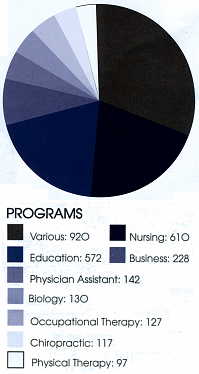“Education is an ornament in prosperity and a refuge in adversity.” – Aristotle
I once thought I had a degree in philosophy — but apparently now my degree is in “various”.
 While browsing through my alumni newsletter, I came across a pie chart showing the distribution of degree programs. It looked something like this … or rather exactly like this, but modified for easier rendering here (image to right).
While browsing through my alumni newsletter, I came across a pie chart showing the distribution of degree programs. It looked something like this … or rather exactly like this, but modified for easier rendering here (image to right).
The largest portion of the pie — over 30% of the total — was labeled “various”. By process of elimination, I realized what was missing from the list: Liberal Arts. It was all the more noticeable to me because I could have sworn that I majored in Philosophy back in the day, and am pretty certain all my old professors still have offices there, teach courses there, and on a panicked fact-finding mission through their website know they still claim to issue such degrees.
Now it is possible “various” refers to many individual degrees, each of which by themselves are too small to justify its own slice of the pie. I prefer to give the benefit of the doubt that it was an unintended slight against us “less practical” types that didn’t go to school for job training.
However, I immediately recalled the college’s fireside chat in January of 2008, where Professor of Philosophy Robert Nielsen noted that you can tell the values of a college by its advertising. And being a true fan of my Alma Mater, I demand utter silence in my household when their television commercials come on, not unlike those waiting for breaking storm warning details, or the reported outcome of a much awaited sporting event. And I took no easy note a few years ago when they stopped listing Philosophy among their scrolling list of degree programs, apparently displaced by the highlighting of new programs, such as International Business.
Now in defense of the college, they have expanded their offerings significantly since my own graduation in the health care fields, and still are known for their teaching degrees. Considering the institution was founded by a saint and personal heroine of mine, such programs by themselves are entirely consistent with promoting lives of direct service to mankind.
But here my bias shows when I say that Liberal Arts is the soul (or conscience?) of an institution — especially one that touts its nurturing of the spirit and humanity within people — and such programs should not be treated as an unwanted stepchild or eccentric uncle. It is not meant as rhetorical when I ask what is medicine or teaching without Humanities? To be fair, I suspect such courses will linger on within the core curriculum, and they may continue to offer degrees in such things for some time … just in case someone succumbs to what many think an odd or archaic choice.
And that is my point — and lament. I do not fault my Alma Mater because they are responding to the needs of the community. To put it more coldly, one could say they are being driven by the forces of the marketplace of learning, according to the demand of the larger society. Eventually economic reality imposes itself on even the most idealistic among us. And that is my greatest concern — the value and place of Liberal Arts and Humanities in our modern, increasingly global culture today and in the future.
But we all fondly speak of the “good old days” and the world has been going to hell in a hand-basket since before Aristotle, so I must be honest and ask: Was it always like this? In 1991, was I merely an exception to a career-oriented world, or was I already an anachronism in a world where the intelligentsia — those men and women who devote themselves to preserve, question, and develop the intellectual and artistic fabric of culture — are being gently but firmly relocated to the realm of undigitized books and retirement homes?
The Shaman, the Scholar, the Priest, the Professor … the names are many, and they are the enemy of autocrats, an alleged burden to taxpayers. Ivory towers are easy targets of criticism, and though often deseved, just as often a straw man. Yet such people are the final sanctuary of knowledge without which there is no meaningful continuity of culture, no ability to stand tall on the shoulders of those who have gone before us. In good times, a society declines with their absence. In bleakest times, such people are either valued for collective salvation and their advice heeded in seriousness, or a society risks a violent transformation into a historical footnote.
So I await the verdict for them and for myself in the world of my own lifetime. When all is said and done, is the reward for such people a merciful shot of hemlock, or a most deserved pension? As for me personally, I can only hope my eulogy read that I was a man of thought and deed, and not under the heading of achievements only the single word, “Various”.


I see what you are getting at and when I went to study computers I took a few such courses and my world opened up compared to my very limited non net related world view. It helped me a great deal.
So I think this being left is is sad indeed and I am glad to have met you at the picket and I had the nerve to go. We need more like you.
Barb
Great to see you putting out your thoughts. Can you add an automatic email for when you update? It was a good recommendation for my site when Kare Anderson went there. Best and Warmest. Jim